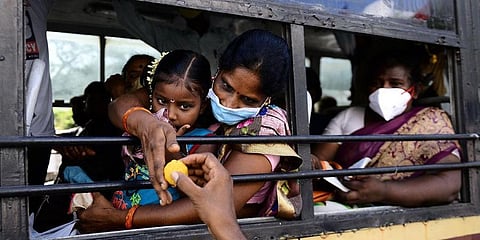

CHENNAI: The free bus travel for women which is being implemented by Chief Minister MK Stalin in Tamil Nadu is attracting attention with experts stating that it will not only boost ridership but also change the lives of the women and boost the economy of the state.
Hailing the new government’s decision to make bus travel free for women, Shreya Gadepalli, South Asia Programme Lead, Institute for Transportation and Development Policy (ITDP) says as per the study by the ITDP India Programme in early 2020, women bus commuters in Chennai highlighted affordability and safety as their biggest concerns.
"They have less access to personal motor vehicles than men and are more dependent on public transport. Free public transport can empower women—give them greater access to jobs and education—and make them more productive members of the society," she says.
Shreya says that as a next step, the state government should consider expanding bus services. ITDP’s People Near Transit study found that, in Chennai, four out of ten women do not have access to buses within easy walking distance. The situation is worse in other cities of Tamil Nadu. More buses will mean less waiting time and less crowded buses—making it safer for women to travel. It should not be seen as an expense but as an investment in the future of women, she added.
Tara Krishnaswamy, the co-founder of 'Citizens for Bangalore', says that the move will change the lives of women, especially in the unorganised sector, who are dissuaded from taking up jobs as costs outweigh their salaries.
"Now with public transport being made free, the women can now travel across the length and breadth of the country. It provides the women financial security, as well as safety to them as more women, will travel in public transport," says Tara.
Interestingly, the free travel facility given to women will cost the exchequer Rs.1200 crore in the annual revenue of the state transport corporations. According to official data, the annual revenue of the TN State Transport Corporations from the city buses (ordinary) is estimated to be around Rs 3000 crores. The working women and girls pursuing higher education are projected to account for around 40% of the TN bus ridership. But then experts believe the measure will help the economy grow in a long term. It will increase the work participation of women thus enhancing the growth of the state economy.
As per official data, the percentage of working women population is comparatively low in Tamil Nadu. According to the 2011 census data, working women contribute only to 31.8% of the work participation rate while men account for 59.3% of the work participation rate. Increasing the work participation rate of women will enhance the growth of the economy. Women would be provided safe and secure travel in public transport to facilitate their higher education needs and contribute economically which would uplift their socio-economic status and growth of the economy.
"I think it's a great step from the TN Govt and it will go a long way in bringing more economic opportunities for women," says Pravesh Biyani, Head, Centre for Sustainable Mobility, IIIT Delhi.
He says that the move has the potential to not only make the commute safer for women but also more efficient. "From my experience in working with the Delhi government, where the women travel using free pink passes, we learned that using technology for "zero cost tickets", a reliable demand data of female commuters can be estimated thereby making transit planning more gender-sensitive, which was not the case so far," he says. The Delhi app - called Chartr has not only been very popular with the female commuters for issuing pink tickets but has also provided reliable travel data to the agency and the government, he says.
According to a Comprehensive Mobility Plan, a transport roadmap for Chennai till 2048, the passenger transport usage has shrunk from 26% in 2008 to 23% in 2018. The study states that 157 lakh daily trips are made in the city with buses having a share of 22.6%. Gita Krishnan Ramadurai, Associate Professor, Department of Transportation, Indian Institute of Technology, Madras, terms the move by the Tamil Nadu government to allow women to travel free in buses as an innovative one.
"With public transit ridership falling, we need innovative ideas to boost ridership. Public transportation is a sustainable transport solution for our cities. It also provides equitable access to livelihood," he says.
This is echoed by Gopinath Menon former Chief for Transportation, Land Transport Authority, Singapore. Getting more people to use public transport like buses is one way to combat traffic congestion and air pollution. Making fares affordable is a sure way to get more to use buses. Making it free for a section of the population, ladies who need to travel, should have a greater beneficial effect on the traffic situation, he says.
A senior transport expert from Maharashtra, Sanskriti Menon, while hailing the Tamil Nadu government's free bus travel for women, said Maharastra and other states should take a cue and also invest in excellent bus-based public transport, especially now when people need support for economic recovery.